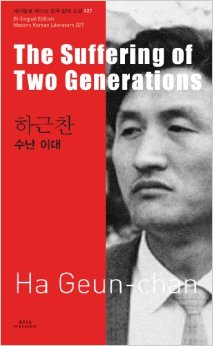
(NOTE: All books are linked to their Amazon pages, for easy purchase!^^)
The Suffering of Two Generations (수난 이대) by Ha Geun-Chan (하근 찬) is what one might call a Korean classic, in that it is taught in the educational system, and thus every Korean raised in Korea has likely read it. It is also known as one of the best, and briefest, evocations of han in the Korean literary pantheon.
<Readers note, “han” is an arguable Korean idea of a special sort of resentment and resignation caused by Korean history. Even different Koreans define it differently, but one way to think about it is; how would you feel after 5,000 years of being pushed around by Japanese, Mongols, and Chinese, and then stuffed sausage-like into a socially overdetermined system like Confucianism. Add poverty, a soupcon of dirt, and a climate that can be punishing, and there you are – han!>
In terms of structure and story, The Suffering of Two Generations is quite simple. As one of the critics in the back of the book notes it is the classic “bridge” story (and it even features a bridge as part of that). The story begins with the introduction of Mando, a simple man with a permanent wound from WWII, who is on a journey to meet his son Jinsu who is returning from the Korean war. He plans to meet his son at the station, and then return home for a celebratory dinner. As is often true in Korean fiction, things don’t go as Mansu might expect, and he and Jinsu’s trip back home is difficult, although ending in a symbolic gesture that is both sad and optimistic
In a sense, this is a hero’s tale (perhaps the tale of two unwitting heroes?), in a very minor-key and Korean way and ending with enough pathos that nearly any reader should be moved. One of Ha’s skills, in the short bit of fiction he writes here, is to move easily from emotion to emotion, and with short brushtrokes of his pen and he moves Mando from place to place and emotion to emotion (and the two are tightly intertwined) with economy and skill.
The Suffering of Two Generations, in its clearly defined generational characters, and its brief but evocative sketch of the suffering of these two generations of characters, is at once a very Korean book and also an international one. The relationship between the father and son is deftly sketched from inside the heads of the characters, and the work that Ha does at the outset of the book with a small scene of seemingly unrelated events, pays off near the end, just before the father and son have to confront the “bridge” to the rest of their lives.
This story was previously published as Ill-Fated Father and Son, in the book Two Travelers (Two Travellers is a collection of nine short works including three from Ha Kun-chan, many of which cannot be found in any other collection) and as The Suffering of Two Generations in Ten Korean Short Stories. The Asia Publishers book has the advantage of being bilingual, and having the criticism and biography built in. I really can’t speak to translation advantages, as the Asia Publisher version under review certainly could have use at least one more look from an English speaking editor, but in the end the slight problems with the English text are overlookable.
Paperback: 82 pages
Publisher: ASIA Publishers (2013)
ISBN-10: 8994006850
ISBN-13: 978-8994006857


